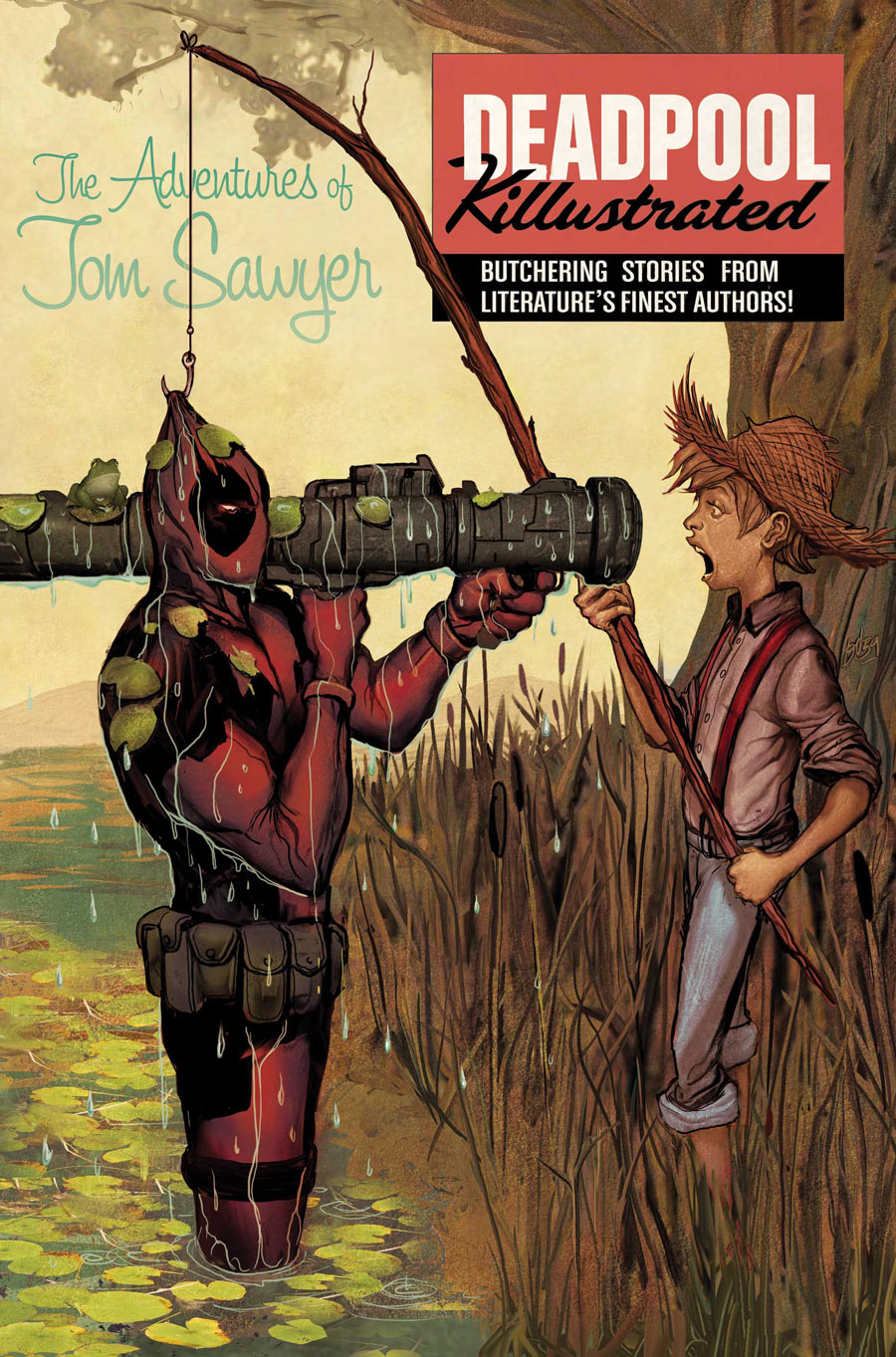The Adventures of Tom Sawyer
"Chapter II: Strong Temptations—Strategic Movements—the Innocents Beguiled"
written by Cullen Bunn
pencils by Matteo Lolli
inks by Sean Parsons
colors by Veronica Gandini
Where Deadpool Killustrated #1 was a witty cudgel, its follow-up is a thick, blunt club. Once again, Mad Thinker's message, a de facto summary of the mini-series' conceptual premise, is the most thematically interesting bit of the issue. Oddly enough, despite being articulated by another Marvel villain trying to sabotage Deadpool's mission, it attributes a kind of freedom-fighting meta-heroism to the kill-happy protagonist. Imagining comic book characters as philosophically autonomous beings forced to endure the often ridiculous and needlessly cruel trials designated to them by their "progenitors"—the comic book creative teams dubbed by Mad Thinker as the "sadistic group thriving on the suffering of their creations" (Deadpool Killustrated #2, p. 2)—makes Deadpool's manic killing spree both ideologically sound, if lavishly bloody, and self-incriminating for the reader, who is necessarily inculpated in the newly imagined non-fictional bloodbath.
Deadpool's actual forays into the literary landscape—Mad Thinker's "ideaverse"—are, however, continually disappointing. His battlefield swagger and casual bravado don't deliver the pointed barbs that they occasionally did in #1, and for the most part the kills themselves are humorous in their graphic farcicality but rather boring in their delivery. The lone exception: the single-page slaughter of Tom Sawyer, seen only as blood splatter and brain bits on a freshly white-washed fence. The others—Captain Ahab, Dracula, the Headless Horseman, and the surprisingly resourceful fighters, the March sisters—are weak.
Bunn does finally start elaborating the thematic affinities between comic book characters and their literary predecessors, but these too seem mostly superficial. Something meaningful might be made out of General Ross's transformation into Red Hulk as a thematic parallel to Ahab's obsessive quest for the symbolically chameleon White Whale, but the reduction of Elektra, She-Hulk, Black Widow, and Mockingbird to Little Women's March sisters simply because they are strong-willed and self-sufficient is almost insulting in its simplicity. Others are more directly derivational, less interesting but more concrete in their cultural heritage. To whatever other cultural figures he alludes, for example, Ghost Rider is certainly indebted to the Headless Horseman.
Sherlock Holmes's solution to Deadpool is, so far at least, also underwhelming. Assembling a small team of characters picked out of literature to take the fight to Deadpool seems as equally blunt a plan as Deadpool's to simply annihilate the entire population of the ideaverse. I expected better from literature's most famous deductive thinker. The team, though is intriguingly hodgepodge: Beowulf, Natty Bumppo, Hua Mulan, and, of course, Dr. Watson.
At its best, Deadpool Killustrated could be a clever and insightful deconstruction of literary inspiration and derivation, and the relative place of individual creativity in the larger cultural landscape. In other words, just what exactly does Ghost Rider owe to Brom Bones? Is every modern vampire causally dependent on Dracula? Instead, Deadpool Killustrated has ignored some of the more interesting consequences of its own thinking in favor of brute force and a more or less ordinary superhero plot.

No comments:
Post a Comment